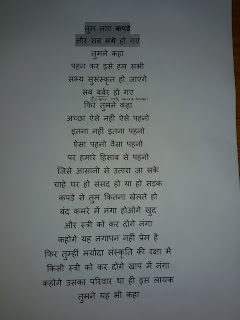Is It Possible to Compare?
Two Great critic, philosopher, writer Nietzsche and T.S.Eliot
Is it possible to compare their thoughts?
Big Question but Let's Try....
Nietzsche's style is evocative. His Philosophy generates passionate reactions running from love to disgust. Throughout his works he talks about possible Great Human Beings who serve as an example of people who would follow his philosophical ideals. These ideals are in Nietzsche's words called The Free Spirit, The Philosopher of the Future, The True Artist or The Ubermensch.
He says that "God is Dead." He says Man is a rope, tied between super human and beasts.
T.S.Eliot tries to find out answers of modern malaise from Upanishads, Buddhism and Christianity. In that sense he seems to be regressive comparatively Nietzsche.
But the theme which is described in The Waste Land is universally appealed. One who falls once in sexual perversion, will defenetly fixed his/her spiritual fall. In this sense Eliot has conveyed deep philosophy of life through his poem. So comparatively Eliot has achieved universality of thought.
Now let's compare Eliot's views with Freud.
Man's primitive instincts should be balanced if we want to avoid chaos in society.
About this, both Freud and Eliot have same opinion.
Freud is saying that primitive instincts should be balanced.
Eliot also expresses the same view with different perspective. He says that Salvation of men lies in the preservation of the cultural tradition. It means our culture itself keeps our instincts in control and helps to avoid chaos.
Now lets have a look upon Indian References taken by Eliot in his poem.
He has taken reference of Ganga, Prajapati and so on. In last part of the poem What the Thunder Said he describes the scenerio between the Creator and his three offsprings : Gods, Humans and Demons. Words are Sanskrit taken from Brihdaranyaka Upanishad. Words suggest a possible escape from the cycle of Life-in-Death & Death-in-Life. Each group of Gods, Humans and Demons ask Creator to instruct them. And the Creator replied "Da".
Gods interprets this as "Damyata" means "Control"
Humans as "Datta" means "Give"
Demons as "Dayadhvam" means "Sympathize".
Last words "Shantih, Shantih... " also refers Indian conclusion of any Shloka. Which suggests peace after all worldly compassions and sufferings.
Thank You.





Comments
Post a Comment